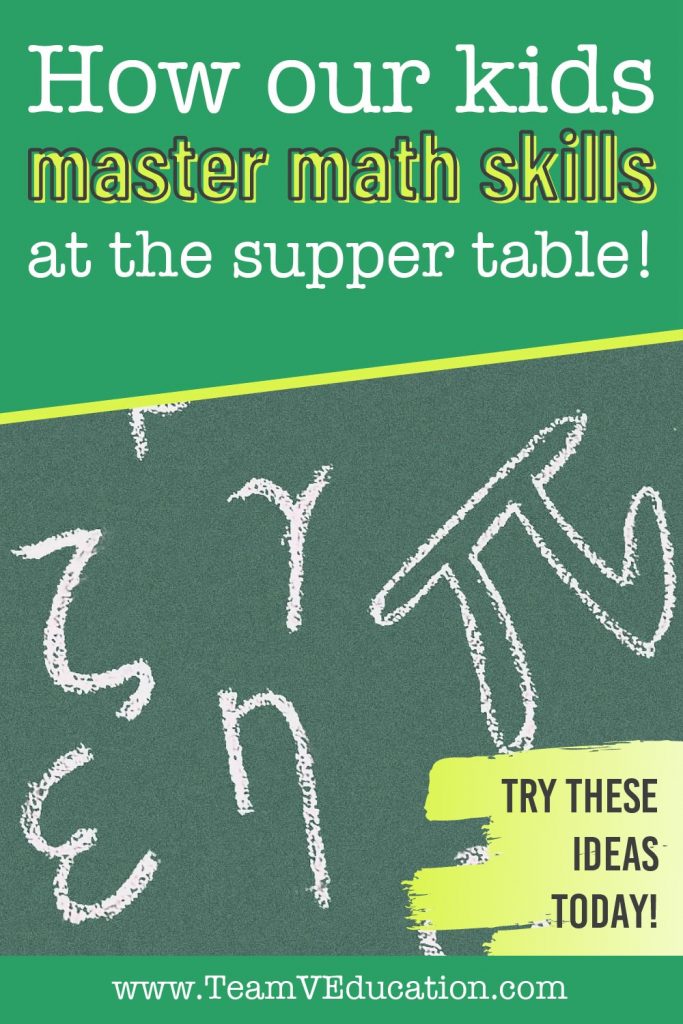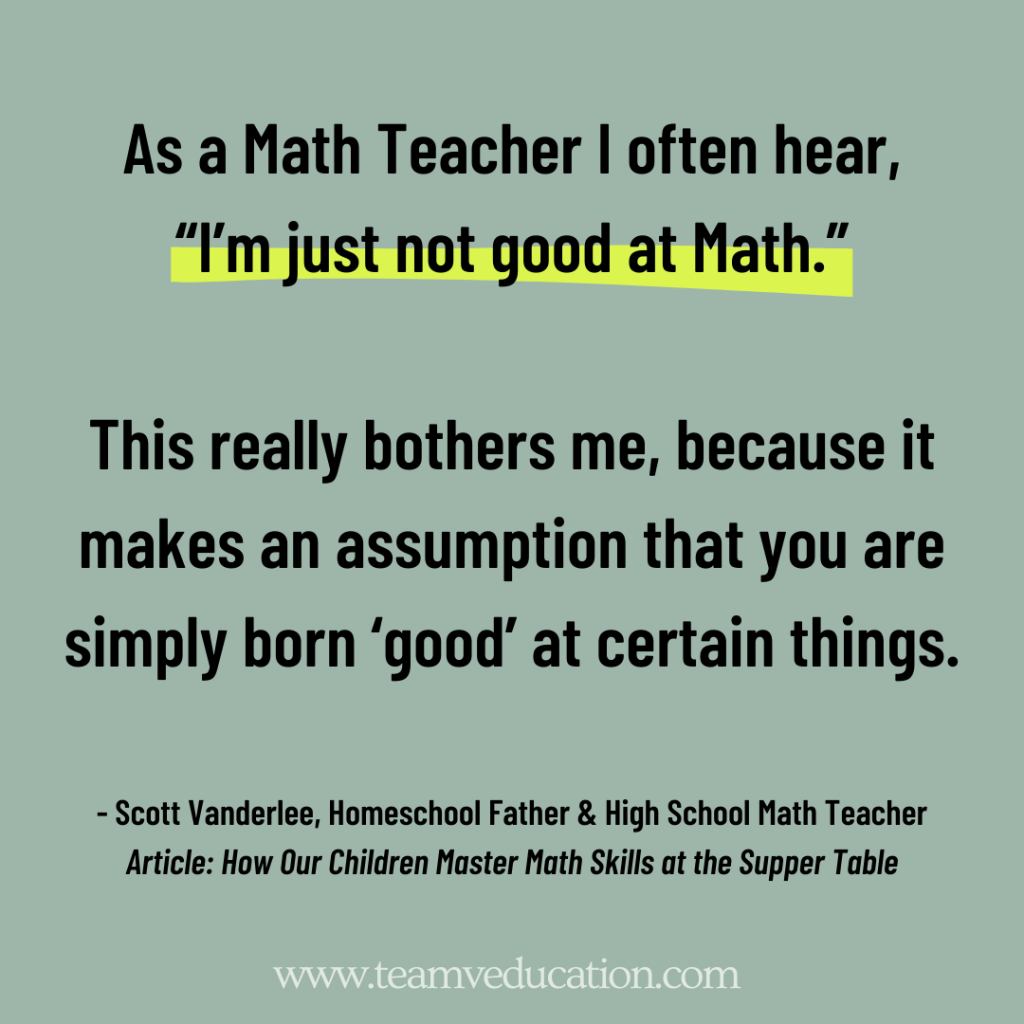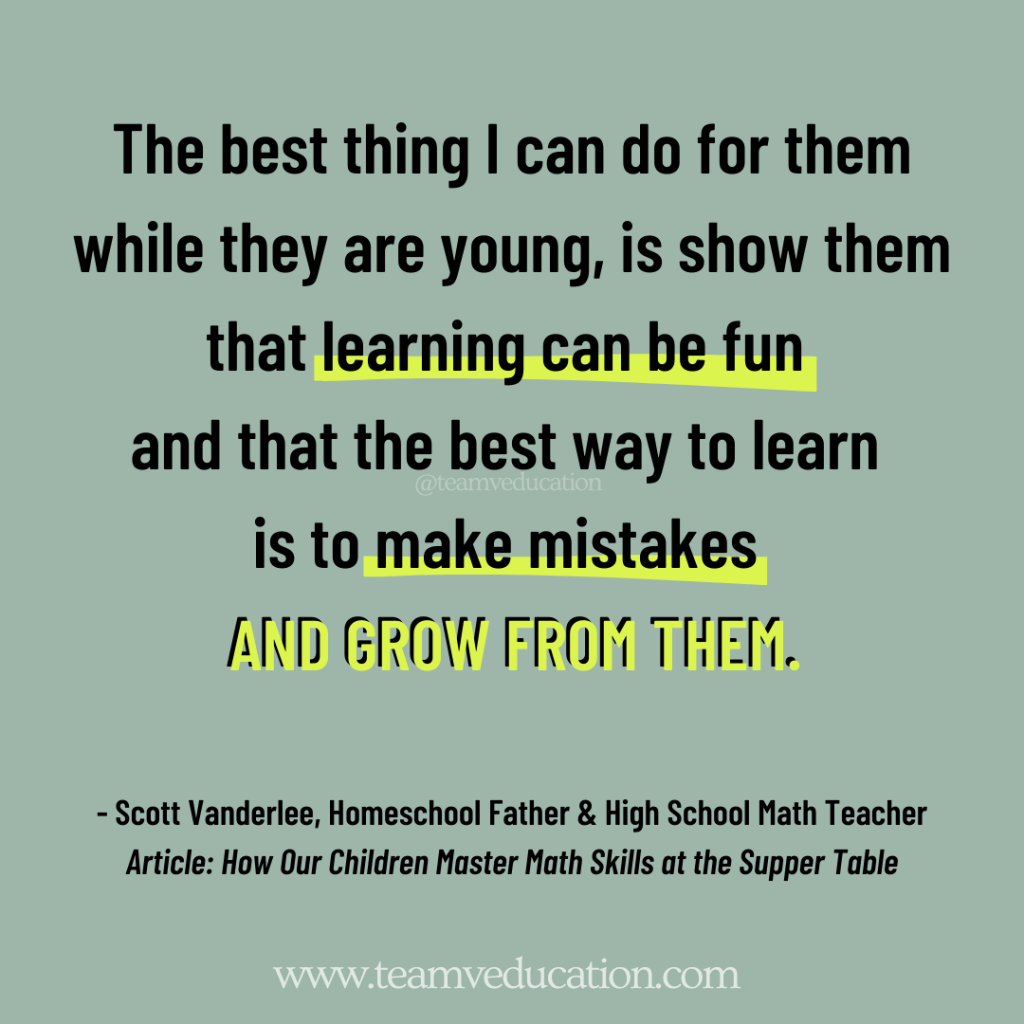How Our Children Master Math Skills at the Supper Table
We are helping our children master their math skills at the supper table. These strategies are so easy that you can get started tonight!
How do we do this?
The short answer: supper conversations that encourage math thinking.
It’s really that simple!
In this article we’ll break down exactly what this looks like on a regular day in our home. And then you get to try it too!
Family Time at the Supper Table
Family time at the supper table is a very valuable time in our household. Not only does it allow us all to reconnect and get a good idea of what is working well in our home and what may need some attention, it also gives us the opportunity to continue our children’s learning and bridge some thinking gaps in a ‘sneaky’ way.
Our conversations at the supper table have taken on many purposes over the years with our children. So before I get into the Math focus, I first want to share our initial purpose for the supper table ‘quizzes.’

Memorizing (Potentially Life-Saving) Information
My wife and I have always believed that it is vitally important that a child knows their parents’ first and last name, as well as details about where they live and how to get in contact with them (our phone number).
So, at a very young age, we started making the children answer a few questions before leaving the dinner table.
Questions We Frequently Ask
- What is daddy’s first name?
- What is mommy’s first name?
- What is your last name?
- What is daddy’s phone number? For a time we made a cool little jingle that helped our kids memorize the digits through song.
- Where do you live? Often our oldest daughter would say, “Here!” followed by a laugh. So the specific question would be, “What is your address?”
These were the common questions for quite some time, until our oldest started working through an increasingly difficult math curriculum. With me being a high school Math teacher, I wanted to check how things were going.
Knowing the concepts my oldest was learning, I would ask related questions.
The questions started off very simple:
- Show me something that is in the shape of a triangle.
- Show me something that is shaped like an oval.
- If I gave you 5 donuts and then you shared one with your sister, how many would you have left?
I stick to using numbers that the younger ones can use on their fingers, but as they get older things can get really fun!
Questions like the donut one above are regulars for my kids below the age of 5.
The Questions Increase in Difficulty as the Kids Age
The beauty of this strategy is that you can change the values and operations based on the needs and readiness of each child.
Our oldest has been working at memorizing the multiplication table, something that is a necessity to be successful in mathematics at the secondary school level.
Yes you can argue that calculators are used and if you can press a button then you do not need to memorize anything, but what if you press the wrong buttons and still think that the answer you see is the correct one?
For example, during an eLearning course I was teaching this last summer, a student recorded that 3 times 5 was 1500. I mean, if you know calculators, this student would have had theirs set to show 2 decimal places and they just wrote down whatever they saw. Unfortunately, they did not write down the decimal place. A short email and phone call helped them out.
Now, I do not want my children to be dependant upon a device to figure out simple math like the example above. I personally do not like allowing calculators to be used because of the level of dependence students develop and the level of learned helplessness that comes with allowing technology when it should be avoided.
We Keep Math ‘Fun’ at the Table
I love learning new math strategies to teach my children, because it keeps me fresh with my math skills. It also allows for some cool tricks at a family get together.
One trick I like has to do with the 5 times table. At first, showing family that you can multiply by 5’s does not seem very impressive, until you pull out a question like, “What is 5 times 70?” and then your seven or eight year old throws out “350” with only a moment of hesitation.
Psst. The trick: half of 70 is 35… then add a zero on the end. That’s all. And that’s only one of the many tricks we work on at the table. Clearly you have a little work to get them knowing what half of 70 is, but you get the idea.)
Now, in case you’re wondering if this trick always works, the answer is yes, but it gets tricky for odd numbers. So 5 times 71 is 355. You just take the closest even number, in this case I am using 70 again, then you add 5 more. If you took the next highest even number, then you would subtract 5 from your answer.
I am not at decimal places with my oldest yet, but soon he will learn that half of 71 is 35.5 and instead of adding a zero we just shift the decimal one place to the right…but we’ll get there one day.
Kids Learning from Each Other
Related: The Ultimate List of Back-to-School Supplies for E-learning, Classroom, and Homeschool
If you did not see how many children I have in an earlier post, I have five kids. What I have found over the years is that as you are ‘quizzing’ one of them, the others are listening and picking up on a few things. By the time their turn comes around, they have already seen and heard many of these tricks being used. It’s a win-win for everyone!
There are no prizes for correct answers, or consequences for incorrect answers.
Keeping it lighthearted and fun is the key to having children want to participate.
It’s Only a Few Minutes a Day
When I was growing up my parents had me memorize the multiplications table. It was very beneficial in my learning, but the Math at home never really extended beyond that point.
The home is where children learn what is important in life. It’s where good habits are formed and identities are created.
Never do I want to hear my children say, “I can’t do that” or “I’m not good at…”
As a Math teacher I often hear, “I’m just not good at Math.” This really bothers me, because it makes an assumption that you are simply born ‘good’ at certain things.

Related: Motivational Quotes to Inspire Students, Teachers, and Parents
The reason we work with our children the way we do is because we know that skills need to be developed and practiced. My kids are growing in their understanding of Math and it is only taking a few minutes at the end of a meal to help encourage them in their journey.
It’s Not all About Numbers
Just to be clear, Math isn’t only about numbers. With younger children you can work on shapes, colours, size comparisons, whatever you want really!
Just the other day my wife was asking our four-year old questions like,
- Who is bigger, you or mommy?
- Who is smaller, you or mommy?
- Who is shorter, you or…..
You get the point.
Math is another language for kids.
Keeping things in perspective and knowing what is being covered in their every day curriculum is a big part of knowing the types of questions you could be asking at the table.
Equip Your Kids with Simple Daily Practice
If they are not yet in school, or their homeschooling program has yet to begin, you still have a responsibility to properly equip you child for success. And building good habits now eventually leads to your child taking the responsibility upon themselves to prepare for their own lessons and assessments.
I don’t ever want my children to be fearful of making a mistake. I don’t ever want them to feel too anxious to attempt work or show up to a class because of feelings of being inadequate. The best thing I can do for them while they are young, is show them that learning can be fun and that the best way to learn is to make mistakes and grow from them.

Related: Authentic Ways to Help Your Kids Feel Safe and Calm at Home
You do not need to be a Math educator to ask a few questions a day that help improve your child’s memory retention. You do not need a diploma to be able to run through some addition and subtraction problems with your primary-aged children.
Supper Table Conversations for High Schoolers
If your children are already in upper level classes, like high school, this does not mean that there is nothing more you can help them with. Here are some easy questions you could ask that will help your child gain a deeper understanding of what they are learning.
- What unit of math are you working on right now?
- What are some of the things you are learning in that topic?
- Can you explain how that works?
- What career may actual use the Math you are studying right now?
That alone will do, if you have regular conversations and are not used to only hearing responses like, “We didn’t learn anything today.” Find a common ground and go from there.
Don’t let them be negative and self-degrading. Math can be really hard. I’m a teacher and I still struggle and require time to review things before teaching it to others.
As parents, we have a calling to send our little ones out into the world with all of the tools necessary to be successful in life. If there is one thing I can be certain of, it is that Math is everywhere and I better make sure my family is prepared to deal with it accurately.
I want everyone to be good with Math. That is my job and my passion as an educator. So, if you are reading this right now and have questions about any of the ideas I’ve covered, please reach out to me in the comments and I will do my best to help you in your family’s journey as well.
You might also enjoy:


Sorry, the comment form is closed at this time.